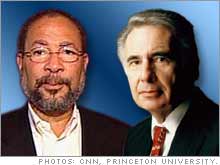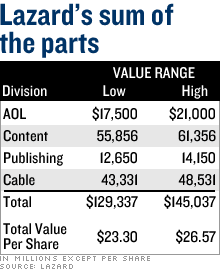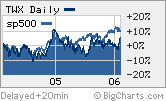|
Icahn calls for Time Warner breakup, buyback
Activist shareholder unveils plan that he thinks will unlock value at the world's largest media company.
NEW YORK (CNNMoney.com) - Carl Icahn, the activist shareholder who leads a group of investors owning about 3 percent of Time Warner, unveiled his plan Tuesday to break up the world's largest media company. Icahn called for Time Warner to split into four companies, AOL, networks and film, publishing, and cable, and for a $20 billion buyback of stock.
According to the plan, which was detailed in a voluminous report that weighed in at nearly 350 pages, the breakup value of Time Warner is $23.30 to $26.57 a share, versus a current stock price of about $18.50. The investor unveiled the plan at a news conference in New York and made it available on a new Web site, www.enhancetimewarner.com. Wall Street was not impressed, and Time Warner (Research) stock fell about 1 percent during regular trading Tuesday. Harold "Hal" Vogel, a veteran media analyst who now runs his own money management firm, said that Icahn's plan has some merit, particularly calls for cutting costs, but said the investor wasn't totally persuasive in his argument to split up the New York-based company. Vogel added that a break-up might not be the answer to the biggest problem that Time Warner and other big media companies face, namely competition from new rivals like Google (Research) and Yahoo! (Research). "All media companies face the same challenges," Vogel said. Working with Icahn are Bruce Wasserstein, CEO of investment bank Lazard, and Frank Biondi, the veteran media executive who Icahn hand-picked to become the CEO of Time Warner if his fight to gain control of the company's board is successful. "If Dick Parsons has the secret super spicy sauce to deliver ... more power to him," Wasserstein said, referring to Time Warner's CEO. "There is no compelling reason today for these businesses to remain together," he said. "Almost every strategic decision regarding AOL has been wrong," he added, noting the company's failure to market a bundled broadband offering with cable until last year. The banker also said that Time Warner's sales of Comedy Central and Warner Music were mistakes that cost shareholders billions of dollars. He added that the company's failure to buy the MGM film library, which was ultimately acquired by a group led by Sony (Research), and the cable business of the old AT&T, which went to Comcast (Research), were also critical missteps. Icahn has been a harsh critic of Time Warner management led by Parsons, arguing that the company would be worth more if it spun off all of its cable division, made more asset sales and cut expenses. "A great company in the media business needs visionary leaders, not a conglomerate structure headquartered in Columbus Circle that second guesses," Icahn said. He said, "The 'Bridge on the River Kwai' is Dick Parson's Columbus Circle," implying that Parsons was missing the big picture. Icahn also said he plans to announce his rival slate for the company's board of directors next week or the week after. He did not comment, however, about whether or not other owners of Time Warner were supporting his proxy fight. There has been speculation that Capital Research, a Los-Angeles based firm that is the largest institutional shareholder of Time Warner, and media investor John Malone, who owns about 4 percent of Time Warner, were considering backing his plan. Some analysts who attended the press conference were skeptical of the break-up plan, however. Richard Greenfield, an analyst with independent research firm Pali Research who was at the meeting, said that it might make more sense for Time Warner to follow the conglomerate structure of other media companies and not spin off all of its cable division. Greenfield noted that Time Warner competitor News Corp. (Research) owns a majority stake in satellite TV firm DirecTV (Research). Vogel, who also was at the meeting, added that he thought Icahn and Wasserstein were a little guilty of double-talk when they referred to how a break-up of Time Warner would help the separate companies grow larger again by making more acquisitions. Parsons has defended Time Warner's strategy and said it will not make moves just to appease shareholders in the short term. In a statement, the company said it would carefully consider the Icahn-Lazard proposal and respond to its specifics "in due course." In a letter to shareholders, Parsons acknowledged that Time Warner's strategy has "delivered excellent results, with one glaring exception -- our current stock price." But he added that senior management was "very confident about the health of our company over the short and longer terms," adding that over time, he believed this would be reflected in the stock price. In the letter, he noted that Time Warner announced a $5 billion buyback last summer and raised that to $12.5 billion in November. Time Warner also plans to sell a piece of the cable business in an initial public offering later this year. In addition to cable assets, Time Warner owns CNN and CNNMoney.com, the Warner Bros. film studio, HBO, AOL, Time, Fortune and People magazines, and other media properties. In his remarks, Biondi estimated it would take nine to 18 months to break up the company. If the plan succeeded he could be Chairman and CEO of the film and network entity to be known as Time Warner, he said, adding he hoped Time Warner president Jeff Bewkes could eventually succeed him as CEO of that business. Biondi worked with Bewkes at HBO. Icahn's latest attack on Time Warner comes when the company has some positive momentum on its side. Time Warner said Monday it was selling its book publishing division, a unit that many analysts had said was not crucial for the company, for $537.5 million. The company also reported better than expected fourth-quarter earnings last week thanks to strong results in its cable, film and network businesses. Wasserstein dismissed the latest quarterly results though, calling the sales growth "anemic," and adding that the sale of the book business was "insufficient." Time Warner's stock is trading near a 52-week high and is up about 5 percent this year. The stock slid 10 percent last year on concerns about sluggish growth prospects in the traditional media business. For more about Icahn's fight to remake Time Warner, click here. For more about Time Warner's earnings, click here. CNN producer Winnie Dunbar contributed to this report.
The reporter of this story owns shares of Time Warner through his company's 401(k) plan. |
| ||||||||||||||||||||



